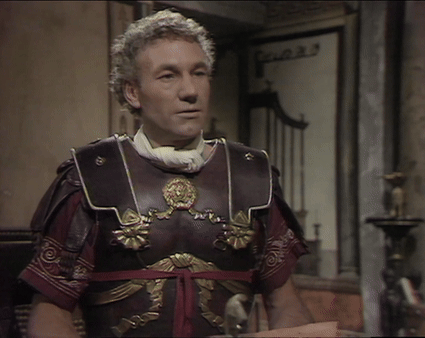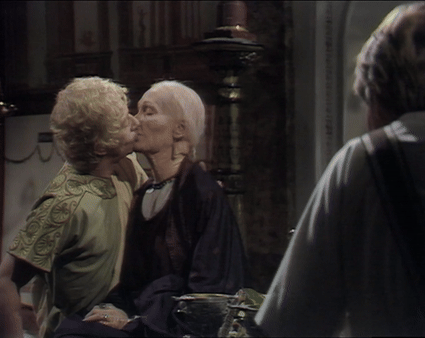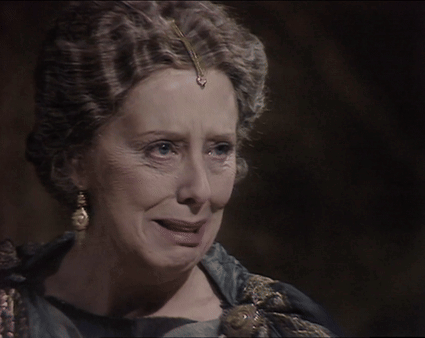#and that conversation between antonia and agrippina
Explore tagged Tumblr posts
Text










I, Claudius Episode 7 Queen of Heaven
I've done many terrible things, Claudius. Well, no ruler could do otherwise. But I've always put the good of the Empire above all else. Well, who saved Rome from civil war again? I did. Augustus would have plunged us into it time and again with his ridiculous favoritism. He set Agrippa against Marcellus, Gaius against Tiberius, Tiberius against Postumus. There was no end to his follies. And it fell to me to... remove them - one by one. Don't say you never suspected. That's why I tolerate Caligula. He's sworn, if I keep his secret... he'll make me a goddess as soon as he becomes Emperor. Now, you too must swear that you'll do everything you can to see that it happens. Don't you see? If he doesn't make me a goddess, I'll be in hell. Hell, suffering torments day and night, year after year after year.
#i claudius#bbc i claudius#claudius#derek jacobi#livia#livia drusilla#sian phillips#sejanus#patrick stewart#patrick stewart with hair#agrippina the elder#antonia minor#margaret tyzack#caligula#john hurt#the dinner at livia's must be contender for my all time favourite scene#when caligula fondles livia but she looks at claudius to see his reaction#also i think that the conversation between claudius and sejanus will never stoop being funny#who will you marry?#marry? i just got a divorce#and that conversation between antonia and agrippina#actually this episode has so many great scenes
22 notes
·
View notes
Text
#thank you! the tree be upon ye is like a curse and a blessing all at once 👍#for the racine bit argent might have misunderstood! junia calls /herself/ the last of augustus’s race when seeking protection#and she calls britannicus the only /nephew/ worthy of augustus’s name (which works since octavia > antonia minor > claudius > britannicus)
@soldatrose oh this makes sense thank you! "Le seul de tes neveux, qui te pût ressembler". Argent translates "neveux" as "descendents" but the sense that works for Britannicus is "nephews".
The ambiguity of Octavian's memory in the play is interesting. As heard in the conversation between Albina and Agrippina, his youth is considered bad but his old age virtuous, which Nero inverts (starting well but ending badly). I suppose this is already as much as an author writing under Louis XIV could allow himself to say.
Despite Junia's words "[Britannicus] could have resembled you", Nero with his cruelty, duplicity, and a passion for acting resembles Octavian much more closely than the naïve, trusting Britannicus ever shows promise to.
In fact, this very moment of Junia seeking protection under the statue of Octavian reenacts a famous episode of Octavian's cruelty (killing Antyllus who sought protection under the statue of Caesar). Through this episode, the trajectory of Caesar -> Octavian -> Nero is clearly visible, logical, and unbroken (and could even be considered different life stages of the same monster). The progress of tyranny culminates in Nero shedding the last trappings of humanity.
It is fitting then that the monster's adversary is a Junia, since another member of the same gens, M. Junius Brutus, failed to "kill him in the shell".
[Side note, Nero's behaviour towards Junia (abduction, self-centered proposal, and threats) resembles Octavian's behaviour towards Julia in Voltaire's Octave et le jeune Pompée, ou le Triumvirat. But in Britannicus, there is no Sextus Pompey to counterbalance a Caesar and provide an escape route; indeed Britannicus is not a functional counterbalance Agrippina wants him to be.]
@soldatrose about the family tree of Racine's Junia, or rather her prototype Junia Calvina!
Syme starts the annotation with the sentence "Abnormally prolific and prominent under the dynasty, this family carries many problems." - which I misread as "this family causes many problems" and cheered.
The tree be upon ye (relevant Junia highlighted):

[Syme, Augustan Aristocracy, XII JUNII SILANI.]
Junia's line of descent from Octavian is Julia the Elder -> Julia the Younger -> Aemilia Lepida -> Junia Calvina. Thus Junia's mother Aemilia Lepida was our Agrippina's cousin.
This Aemilia Lepida was not descended from the triumvir Lepidus but from his proscribed brother Lucius Aemilius Paullus [shown at Syme, Augustan Aristocracy, VIII THE AHENOBARBI].
It is odd that Racine's Junia, when addressing Octavian's statue, calls Britannicus his last descendant, when Britannicus was not descended from him at all (unlike Junia, Agrippina, and Nero) - something that Argent notes in his commentary.
Fun fact: Junia Calvina's sister Junia Lepida married a Gaius Cassius Longinus (suff. 30 ce). It just keeps happening.
6 notes
·
View notes